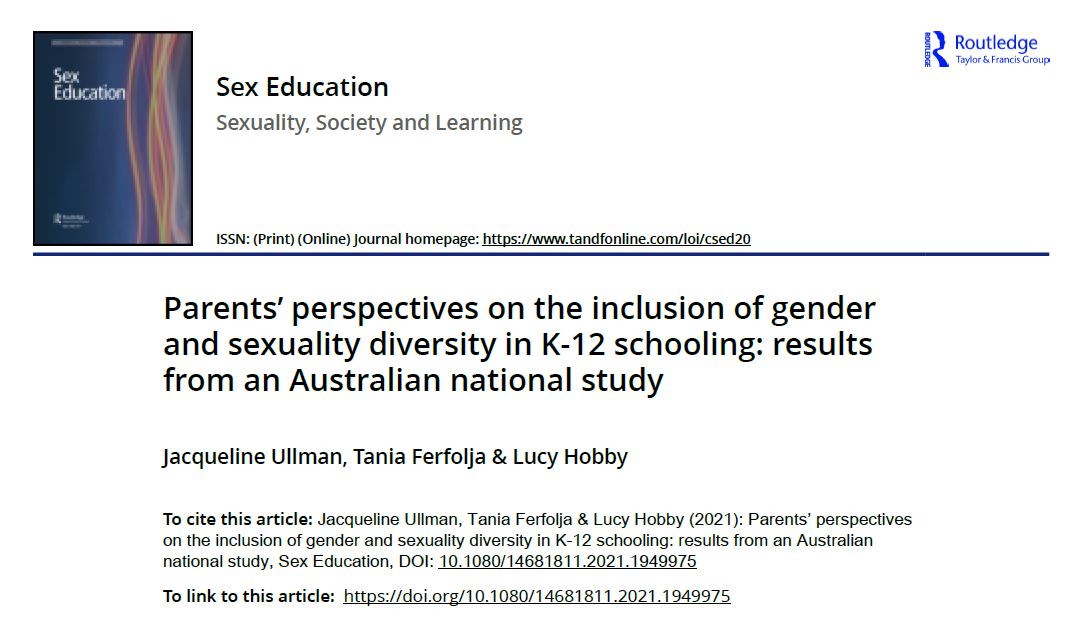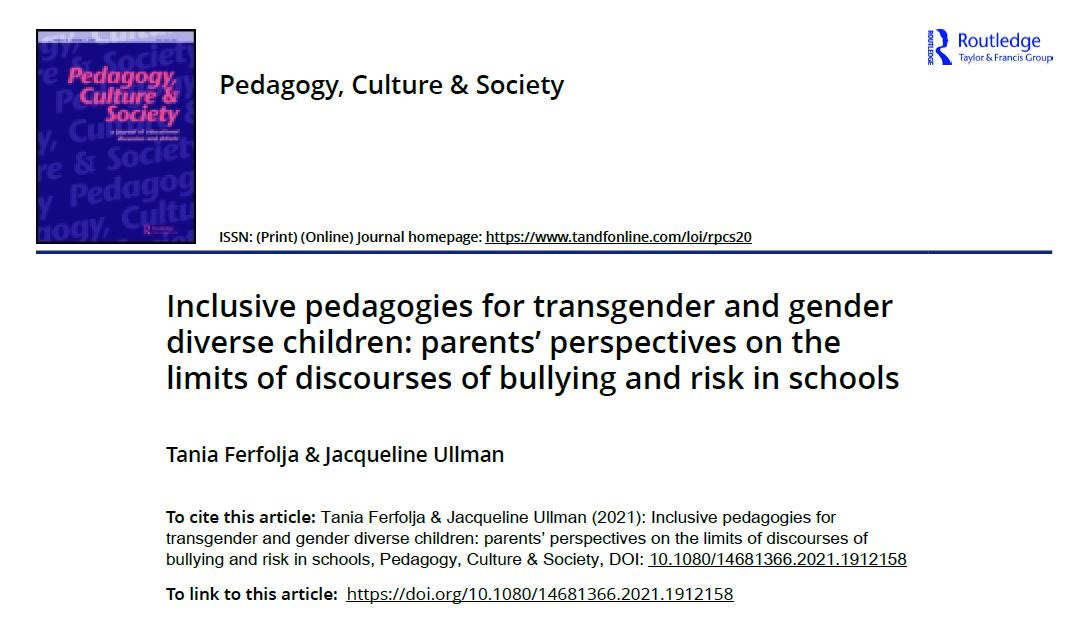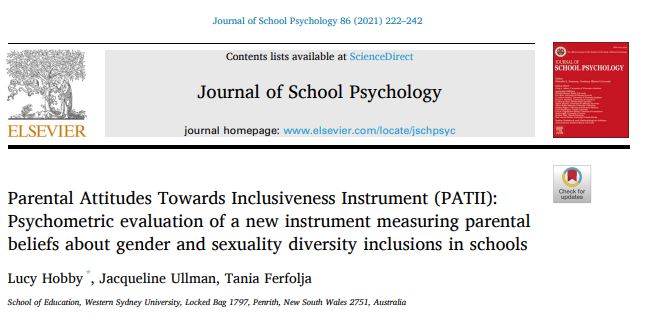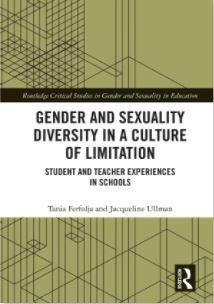Publications
Peer Reviewed Articles/Chapters
This paper presents our nationally-representative data on Australian, government school parents’ perceptions (n = 2093) about the inclusion of gender and sexuality diversity and related topics within the K-12 curriculum. Results include parents’ sense of the purpose and appropriate providers of Relationships and Sexuality Education, as well as their perspectives on when specific topics/broad content areas should be introduced across the primary/secondary schooling years. Trend data shows that parents overwhelmingly support the inclusion of gender and sexuality diversity as an element of Relationships and Sexuality Education and would like to see many topics - such as diverse families/relationships and harassment/discrimination of gender and sexuality diverse individuals - introduced during the primary years.
This paper draws on interviews with a sub-cohort of parent participants from our larger national project, specifically parents of a transgender or gender-diverse (TGD) child, to examine how these young people navigate their school environments. Parents’ narratives highlighted the ways in which TGD students are positioned in discourses of risk by schools and how the discrimination and harassment they encounter is depoliticised through bullying and safety discourses. Parents of TGD children highlighted the limitations of departmental and school-based policies related to the ‘management’ of transgender students. Further, they discussed the constraints of properly challenging transphobic behaviours when bullying policy frames these interactions as individual incidences, rather than as evidence of larger-scale discrimination. A pedagogy of containment seemed to place the burden of gender identity, relationship management and education on the TGD student and their family, highlighting a need for more professional development of school personnel.
This paper outlines the development and initial testing of our new, multidimensional measure of the theorised nature of parental attitudes towards inclusiveness, the “Parental Attitudes Towards Inclusiveness Instrument” (PATII). Working with a pilot sample of 998 parents with a child attending school in any grade from Kindergarten to Year 12, the PATII was evaluated for its reliability, construct and criterion validity, and measurement invariance utilizing exploratory structural equation modelling (ESEM), with initial ESEM analyses also compared to traditional confirmatory factor analysis (CFA) methods. Factor scores were reliable, valid, and invariant across sex, religiosity, and nationality groups within this sample.
Ullman, J., & Ferfolja, T. (2022, under review). Constructions of ‘Fault’ and Other Reductive Approaches: Parents’ Considerations of School-Based Bullying of Gender and Sexuality Diverse Students. In E. Payne & M. Smith (Eds.), Gender, Sexuality, and Social Violence in Schools: The Limits of Bullying. Routledge. |
Research with gender and sexuality diverse (GSD) school students overwhelmingly highlights their experiences of harassment and social marginalisation, often alongside data on the invisibility or silencing of gender and sexuality diversity in the school curriculum. This chapter focuses on the experiences of parents of GSD students across primary/elementary and high schools, a sub-cohort of a larger, national sample of Australian parents. Nationally, parents were in near-universal agreement that students should learn about the negative impacts of discrimination and bullying for GSD individuals; however, parents of GSD children described environments where such behaviours were met with highly reductive responses. From victim-blaming and isolation of GSD students to euphemistic, or otherwise insufficient, approaches to discussing gender and sexuality diversity, many parents’ narratives spoke to the failures of a generic anti-bullying strategy, particularly where classroom conversations failed to acknowledge and affirm GSD identities. Findings from these explorations echo previous work from the field and support the need for more sophisticated training for educators and administrators on improving school social cultures by educating about, and halting, GSD bias-based harassment.
Ferfolja, T., & Ullman, J. (2022, under review). Australian Parents of Gender and Sexuality Diverse Children: Labouring Through the Schooling Experience. Gender & Education. |
This paper focuses on data from an online forum provided for parents of gender and sexuality diverse (GSD) children attending K-12 Australian public schools, a sub-cohort of parents from our larger, national sample of parents. This paper explores the ways in which parents of GSD children strategise to protect their child/ren from an educational climate that is often hostile and uninformed about gender and sexuality diversity. Although parents generally put significant time into their children, the findings illustrate how participating mothers of GSD children provided considerable additional labour to ensure the well-being of their child at school. Several themes illustrated this labour, including: educating the educators; seeking external support; checking in; addressing marginalisation and abuse; dealing with bureaucracy as well as curriculum surveillance and monitoring. Much of this labour stems from schools and teachers who are inadequately prepared to work with GSD young people.
Ullman, J., Hobby, L., & Ferfolja, T. (Forthcoming, in preparation). Parental Attitudes Towards Inclusiveness Instrument (PATII): Revalidation in a Nationally Representative Australian Sample. |
This paper will detail the process of revalidation of the PATII instrument with our national sample of Australian parents of children attending government schools. Revalidation confirmed two higher-order factors (“supports” and “barriers”), each with a group of corresponding first-order factors. Factor groupings are as follows:
Higher-Order Factor: “Supports” [includes first-order factors: “Oppression”; “Wellbeing”; “Equality”; “Personal Importance”]
Higher-Order Factor: “Barriers” [includes first-order factors: “Religious Values”; “Suggestibility”; “Appropriateness”]
Stand alone, first-order factor: “Parental Capability”
Related Books
Ferfolja, T., & Ullman, J. (Forthcoming). Understanding Parents’ Perceptions of Gender and Sexuality Diversity in the Classroom: Allied, Opposed or Unsure. London: Routledge. | |
| Ferfolja, T., & Ullman, J. (2020). Gender and Sexuality Diversity in a Culture of Limitation: Student and Teacher Experiences in Schools. London: Routledge. |




